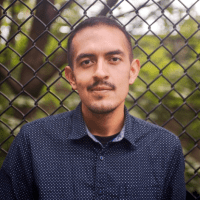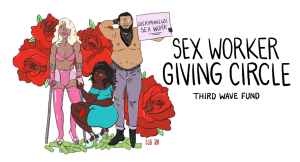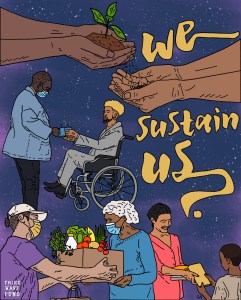
Christian Giraldo
Who keeps us safe?
Third Wave Fund is a national feminist and gender justice activist fund that resources the political power, well-being and self-determination of social movements led by young women of color, queer, trans, intersex and gender non-conforming youth. Third Wave Fund upholds that we will achieve deep political, economic and social change if and only if we invest in people directly impacted by systems of power to design solutions and lead the charge toward transformation.
Third Wave Fund has been funding sex worker–led organizing for more than 20 years because we know that resourcing sex worker liberation is central to our goals of gender and reproductive justice. Our grantees taught us that sex workers and people in the sex trade face high rates of violence and discrimination, not because of anything inherent to sex work, but because sex work itself is criminalized, stigmatized and interlocked with other systems of oppression, including gender-based violence, white supremacy, poverty, ableism, queerphobia1 and transphobia.

The SWGC logo, with artistic credit to JB Brager
We see time and again what movement leaders confirm: Sex worker–led groups have the best strategies to confront and transform the oppressive social and economic conditions of their own lives. Given this political and philanthropic insight as well as our investment in fostering leadership from the communities we fund, Third Wave Fund stepped up its commitment to sex worker-led movements with the creation of the Sex Worker Giving Circle (SWGC) in 2018.
The SWGC is a cross-class, multi-racial and intergenerational giving circle made up of people with current or former experience in the sex trade. Our approach to grantmaking is participatory, inclusive and high touch. This means Third Wave Fund is deeply engaged with sex workers living and organizing at the intersections of multiple oppressions and lived experiences. Through SWGC, current and former sex workers participate in a Fellowship program with a popular education-style curriculum that prepares members of the community to mobilize resources, strengthen their relationships, engage directly in grantmaking, and receive support to bring their voices and leadership into philanthropy and social movement organizing. The program is completely by us and for us, and all of the grantmaking decisions are made by sex worker Fellows, guided by the input of sex worker advisers, and supported by the programmatic and fundraising know-how of sex worker staff.
In 2021, the SWGC expanded the Fellowship program to meet the ongoing challenges and uncertainty caused by the pandemic, and we took advantage of our new lives working and organizing from home to launch our 4th overall and 1st fully national cohort of sex worker Fellows. Our first national Fellowship reviewed 35 applications, met with 18 prospective grantees and chose 12 grantees for funding, including 7 new organizations. In total, the SWGC has broken the $1.55 million grantmaking mark, with a total of 36 groups awarded grants since the start of the fund.
How funders can be part of the solution: 4 key lessons
The SWGC has grown tremendously over the last 4 years, and we’ve learned many important lessons from sex workers doing on-the-ground work that we would like to share with the broader field of philanthropy.
First, we have learned to provide unrestricted general operating grantmaking dollars and multi-year commitments whenever possible. This allows groups to cover the real office, salary and overhead costs of existing as well as the tools and physical and virtual spaces to do their work. During the COVID-19 pandemic lockdowns, groups depended on general operating funds to provide life-saving monetary mutual aid and other urgent material resources to the broader community, which kept the movement alive and healthy enough to fight another day. Sex workers found themselves in the impossible reality of needing to stretch every last penny of their shoestring budgets to feed, house and care for their comrades, most of whom had been systemically excluded from government unemployment and economic stimulus packages due to working in informal and street-based economies or lacking eligibility documentation. The never-ending task of organizing sex worker survival cost the movement community members who didn’t have the resources to take in a moment of stillness and recovery and literally worked themselves to death. Sex workers have taught us that when their own economic and material realities are nourished and not under constant interrogation and attack, they are empowered to speak to funders and other resource gatekeepers with less fear and more sex worker power. More sex worker power keeps communities alive.
Second, the movement taught us to center trauma-informed approaches to grantmaking during these chaotic times through coordinating our program with empathy, accountability, flexibility, creativity, humility, generosity, approachability and urgency. The pandemic, economic recession, violent displays of white supremacist police brutality, alliance of ideologically paternalistic anti-sex worker forces and expansion of the for-profit carceral state have worn down sex working communities and deteriorated the physical and mental wellbeing of sex workers. Now more than ever, funders must account for the disparity in power dynamics between philanthropy and the movements we support and how these dynamics are always present, even if we’re actively trying to dismantle them. We must approach conversations by radically self-critiquing our participation as funders in creating power differentials and understanding that our every action creates a world. Funders must always ask ourselves: What kind of world are we creating for sex workers in our grantmaking and interactions with the movement? We must also reflect on how we show up in conversations with the movement and the power that we wield – reluctantly or not – and lean into the necessary discomfort of acknowledging the many power differentials we may unwittingly contribute to and that make up sex workers’ scarce material realities.
Third, as a bilingual English/Spanish program, the SWGC learned that funders must embrace and systematize language justice as core to our values. Spanish-speaking grantees taught us that monolingual Spanish-speaking groups face the baseline exclusions confronted by all sex working communities, coupled with systemic injustice around language barriers, racism, colorism and immigrant status. High levels of discrimination and racist policing made many Spanish-speaking and Latinx sex workers afraid of engaging with state bureaucracy on any level and deprived them of an avenue for accessing resources to meet their basic needs. Lack of language accessibility creates challenges for Spanish-speaking groups that make it harder to write grant applications, organize fundraising campaigns, communicate with funders who are not prioritizing their inclusion, and secure legal non-profit status and bank accounts. There are fewer resources and information available in Spanish, and many philanthropic programs do not acknowledge language disparities in their processes. Some programs may provide and accept applications in Spanish, but do not have staff who can speak to grantees in Spanish, provide support, and attest to the disparity in access to resources and opportunities faced by monolingual Spanish-speaking people in the United States.
Finally, we have learned that funders who support sex workers’ rights must stop imposing unnecessary and harmful bureaucratic challenges on groups on the ground. Ideally, funders should grant to groups without requiring fiscal sponsors, who may at times act as gatekeepers, hurt the work of grantees, and further traumatize a community that is already maligned and kept from life-saving resources. If fiscal sponsorship is required, it is crucial to allow grantees to apply for funding before obtaining sponsorship—and then support them in finding a fiscal sponsor who is a good match as a condition of grant receipt, while making funds available to cover any fiscal sponsorship fees so that groups can use the full amount of their grant. Additionally, funders should support groups that have a diversity of tax statuses, ranging from groups with no legal status at all to groups that are fiscally sponsored, as well as groups that have gained their own 501(c)(3) status. In the case of groups working toward securing 501(c)(3) status, funders should do everything in their power to support their petitions and accompany them in their journey jumping through the infinite and spiritually draining hoops of the nonprofit industrial complex.
Accompliceship, not charity

Artistic credit: Grae Rosa
We see amazing potential for participatory programs led by directly impacted communities to shift the discourse away from voyeuristic donor-driven charity and into accompliceship and wealth redistribution. To realize the dream of sex worker liberation and decriminalization, we must build mutual trust with sex workers and transform the power dynamics that paint the realities and material conditions of sex working communities.
As we move into our spring 2022 cycle, we reflect on the fact that sex workers at the intersection of interlocking systems of oppression are finally being funded to organize openly, unapologetically and on their own terms. This is in itself a momentous deal! It means that people who have been organizing from their phones can get a laptop for the first time, create virtual spaces for sex workers to build alliances across the country, and stay connected to members of the community incarcerated for working to survive. It means we are investing in the healing justice of movement leaders who have been tirelessly building support systems while emptying their own sex work-funded pockets to maintain their people’s survival. Directly funding the well-being, bodily autonomy and organizing of sex workers most impacted by oppression is in itself a radical vision and our biggest impact. With a little creativity and a lot of trust in the leadership and experiences of sex workers, it can be a big part of your impact too.
Christian Giraldo is the Program Officer of the Sex Worker Giving Circle at Third Wave Fund.